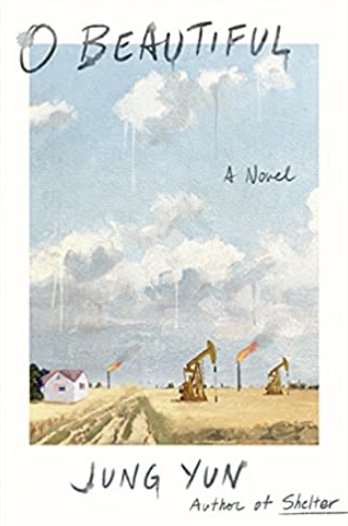O Beautiful by Jung Yun (St. Martin’s Press)
“So you’re Elinor Hanson, huh? You must have married a Viking or something, “ a North Dakota farm woman greets the reporter who’s come to interview her. Elinor’s used to this. She grew up in rhis area and has been asked the follow-up question since she was able to talk. “Your father was American and your mother was…?”
North Dakota is white people country, which is why Elinor’s Korean mother left it, deserting her half-white daughters and her white husband. Once she graduated from high school, Elinor did the same thing. She boarded a bus to New York City where her beauty allowed her to be a model, a woman who’s “looked at for a living.” Now in her forties, still pretty, she’s back in her home state as a freelance journalist, assigned to a story on the changes brought by the Bakken oil fields.
Groggy after her journey from New York, uncertain if she was sexually attacked on the plane while she was knocked out by a sleeping pill, Elinor is unsettled by the unfamiliarity of a town she used to know.
Her looks have made her accustomed to male attention and she grew up knowing she was an outsider, neither white nor Korean. But now, in Avery, North Dakota, she’s unique because she’s a stunning woman in a town that’s overtly and crudely dominated by men. “I’ve never been in a place where there are so many men. Where I feel completely outnumbered,” she tells her editor during a Facetime meeting.
When she was a model, the gaze of a male photographer meant a paycheck. Now as she struggles to find work in a different competitive field, male gazes have become an annoyance. In Avery, they strike her like a bludgeon. Catcalls and lewd gestures greet her when she gets out of her car, a raucous and obscene version of the attention she routinely receives from men in New York. Equally upsetting are the conversations in which racial slurs are casually directed toward anyone who’s not like the typical resident of North Dakota.
A white town hit by a “diversity bomb” of oil workers, Avery has decided they’re the scapegoats for every problem that’s come with the petroleum industry. When a young white woman disappears, local vigilantes turn to the oil fields and grab two likely suspects, one Black and one Mexican. Nobody seems to know what was done to those men. They’re no longer around and that’s all that matters.
As Elinor spirals into a long series of serious mistakes, she’s caught in a claustrophobic web that’s tinged with horror. The view she loved as a child, the empty land that stopped only when it reached the horizon, is now clogged with drilling rigs and the crews that work on them. The air smells like Vaseline’s petroleum jelly. The women have turned into gleeful sexual trophies, their scarcity giving them an intoxicating illusion of beauty, making them prey. Then there are the American flags hanging upside down in random farmhouse windows, puzzling and shocking signals, but what are they signaling? Who are they calling? “Some people say it’s a distress signal,” a man reluctantly tells Elinor. The flags are placed that way, he says, because of “people who look like you.”
This difficult novel with its mixture of brutality and hope gives a bleak view of what America is and what it has lost. O Beautiful strips privilege from its readers as starkly as it does from Elinor. A graphic examination of misogyny, racism, class divisions, environmental damage, and xenophobia, it offers a form of Rorschach test. How much are we prepared to overlook? How much does it take to make us flinch? As Jung Yun sees it, we’re all being groped in a dive bar--or on a plane--and our beauty isn’t going to save us.~Janet Brown
